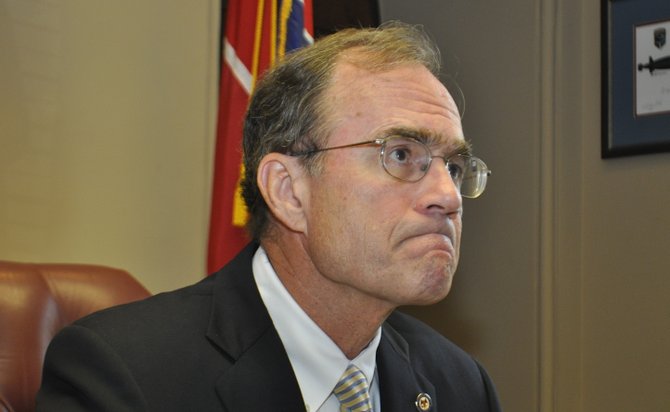Mississippi Secretary of State Delbert Hosemann expects the state’s voter-ID law top be in effect by the 2014 midterm elections. Photo by Trip Burns
If there existed a university devoted to voter suppression and disenfranchisement before the passage of the 1965 Voting Rights Act, Mississippi would have graduated with Latin honors.
Tactics ranged from the relatively humdrum Jim Crow instruments of the time, such as poll taxes and impossible-to-pass oral tests, to the famously violent practice of murdering voting-rights workers in cold blood. Those practices, commonplace in Mississippi and throughout the South, help usher in the VRA and its primary enforcement mechanism, a federal oversight process called preclearance.
On June 25, the U.S. Supreme Court nullified the formula outlined in Section 4 of the act that determines the cities, counties and states that must receive federal permission to change even minor election procedures.
Mississippi's top elections official, Secretary of State Delbert Hosemann, applauded the decision, saying Mississippi has worked to cross beyond government-sanctioned policies that excluded blacks from the voting process until relatively recently.
"Those achievements are made by the fact that we trust each other. We trust each other to conduct our elections and to conduct our legislative affairs and that trust was confirmed by the Supreme Court," Hosemann told reporters in his Capitol office the day the Supreme Court handed down its 5-4 ruling.
The ruling in the VRA case, Shelby County, Ala., v. Eric Holder, wasn't terribly surprising given the court's composition. The jurisdictions covered under preclearance—Section 5 of the act—include mostly southern states with a history of racial discrimination affecting elections, but also applies to some northern cities such as New York City and the state of Alaska, with its record of Native American discrimination. The court did not address the constitutionality of Section 5, which means that Congress could develop a new formula that meets constitutional muster.
Civil-rights advocates nationwide let out a collective moan of disapproval believing the ruling will open the floodgates on renewal of voter suppression. That includes voter-identification laws, many of which were held up for preclearance but now can be implemented.
Hosemann, one of the key backers of Mississippi's voter-ID law, is not running a victory lap, yet. In a May interview with the Jackson Free Press, he said that even without preclearance, Mississippi would still have to comply with Section 2 of the act, which bars the state from implementing discriminatory voting laws.
"For example, you couldn't say that Catholics can't vote, which we tried to do in Mississippi, or that women can't vote, which we tried to do—or the Jim Crow laws, which we also did.
"There's a whole series of things that have impeded people's right to vote and that comes under the constitutionality portion (of the Voting Rights Act). So the preclearance would go away, but individuals who may challenge voter ID would still have the ability to question the constitutionality of it," Hosemann said.
State Sen. John Horhn, D-Jackson, and a member of the state's Legislative Black Caucus, called the ruling "a sad day in the United States" and said he would eat his hat if anyone could prove that voter discrimination is indeed a thing of the past. He dismissed Hosemann's statement that Mississippians trust each other to no longer need the federal check-and-balance of preclearance.
"This will have a chilling effect," Horhn told the Jackson Free Press.
Sen. Kenneth Wayne Jones, D-Canton, who chairs the Legislative Black Caucus, views the VRA ruling another way: "It seems like America is going backwards."


